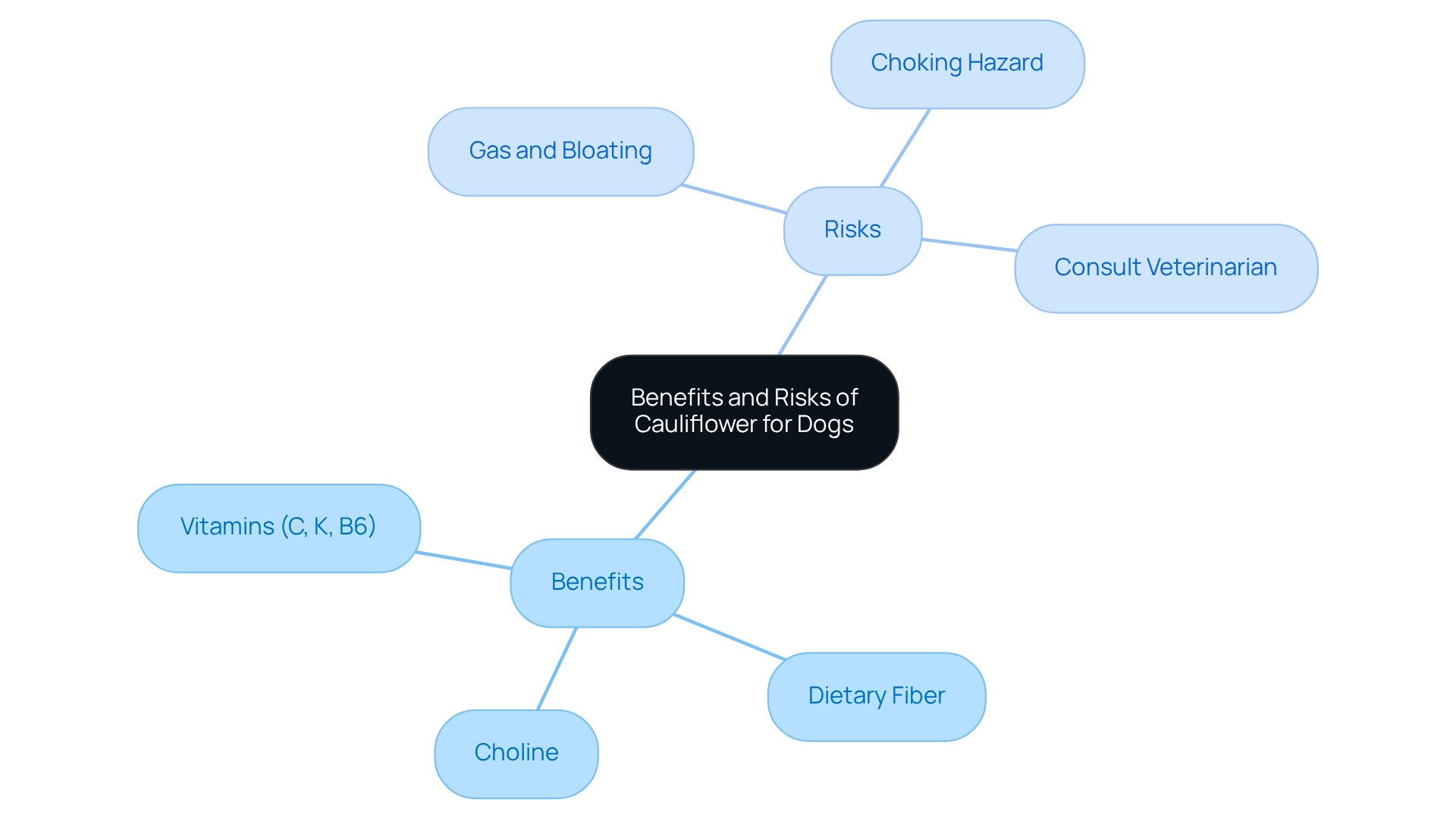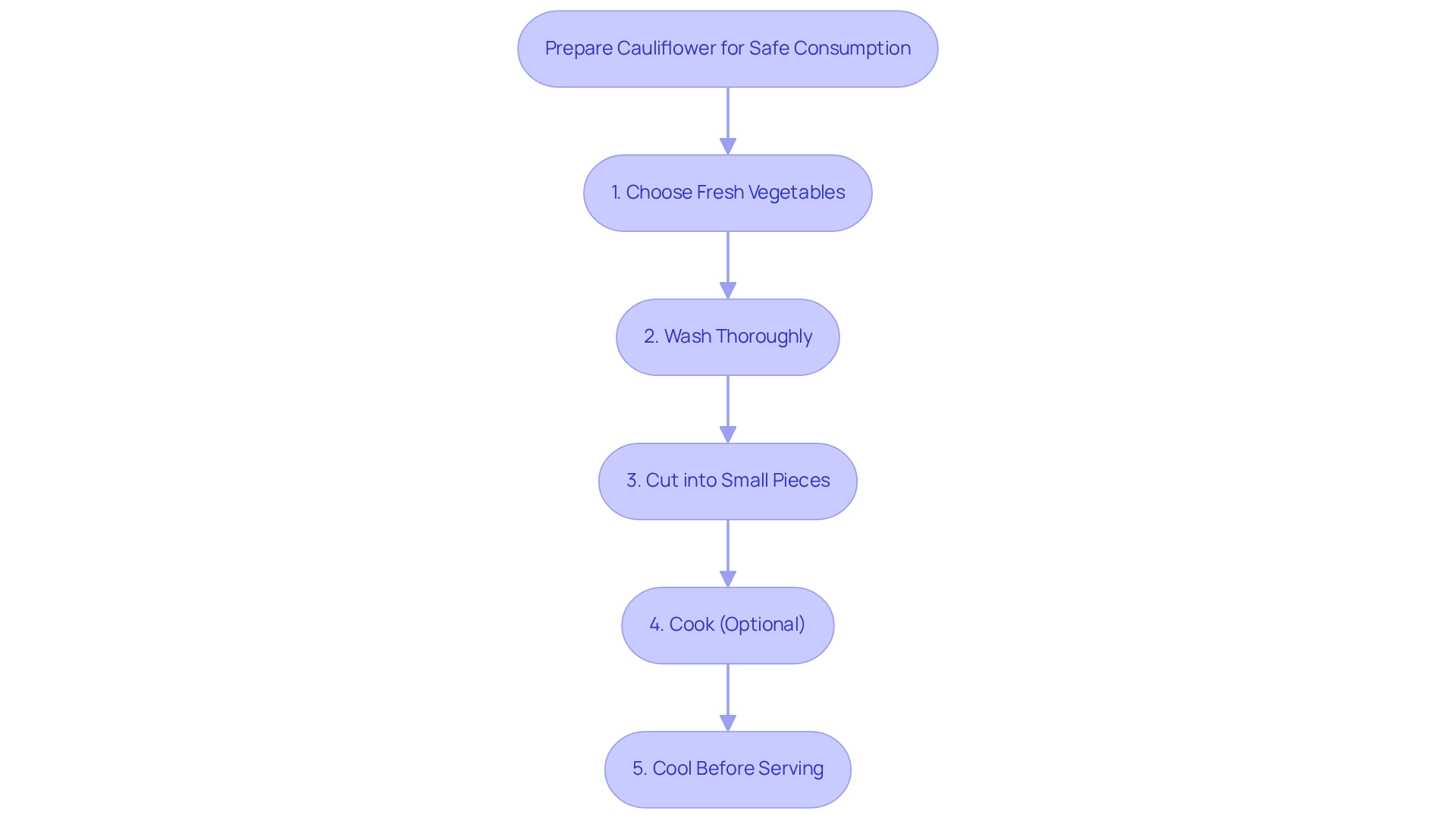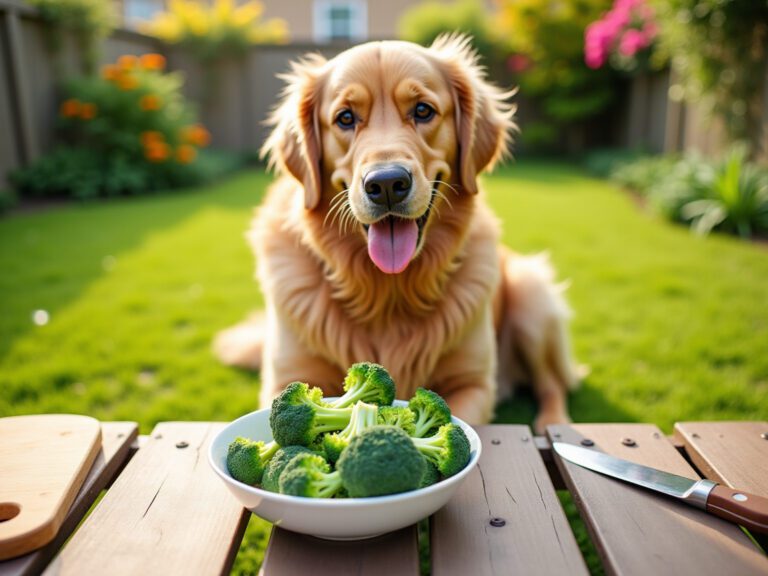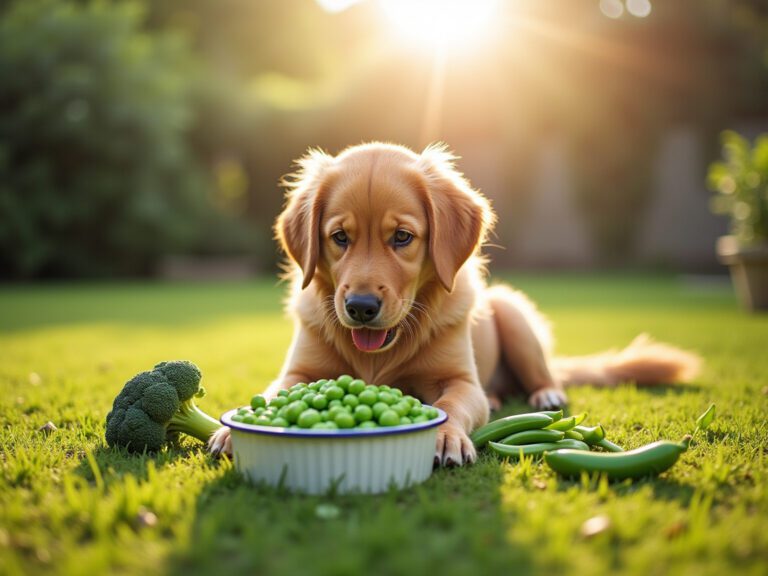Can Dogs Have Cauliflower? Safe Steps for Introducing It
Overview
As a loving pet owner, you may wonder about the best foods for your furry family members. Good news! Dogs can safely enjoy cauliflower when introduced in moderation. This nutritious vegetable is rich in vitamins and fiber, making it a wonderful addition to their diet.
However, it’s essential to introduce it gradually and monitor for any digestive issues. Consulting with your veterinarian is always a wise step to ensure that this addition aligns perfectly with your dog’s unique health needs.
By taking these steps, you can create a nurturing environment that supports your pet’s well-being.
Introduction
In the quest for a healthier diet for your furry family members, cauliflower has emerged as a popular option for dog owners eager to enhance their pets’ nutrition. This nutrient-rich vegetable is packed with a wealth of vitamins and minerals that can contribute to overall canine health when introduced thoughtfully.
However, alongside its benefits, there are potential risks that caring owners must navigate to ensure their pets enjoy this treat safely. Understanding proper preparation methods and recognizing signs of digestive upset are essential for a nurturing approach.
This article delves into the advantages and precautions of incorporating cauliflower into your dog’s diet, providing practical tips for pet owners who are eager to explore this vegetable’s benefits while prioritizing their beloved companions’ well-being.
Understand the Benefits and Risks of Cauliflower for Dogs
When offered in moderation, a nutritious vegetable like cauliflower can dogs have as a wonderful addition to your furry family member’s diet. This low-calorie food is rich in essential vitamins such as C, K, and B6, along with dietary fiber that supports digestion. Significantly, this vegetable is also a source of choline, an important nutrient for maintaining healthy cellular function. Dr. Lauren Demos, a compassionate veterinarian, reassures us, “The information is current and up-to-date in accordance with the latest veterinarian research.”
However, as loving pet owners, we should be aware that when considering if can dogs have cauliflower, this vegetable can lead to gas and bloating in some dogs, particularly if introduced abruptly or in excessive quantities. To mitigate these risks, it is advisable to remove the stalk before serving, as it poses a choking hazard—a point emphasized in the case study titled “Safety Precautions When Feeding Cauliflower.”
While this vegetable is nutrient-dense and not poisonous, it should be offered as an occasional treat due to concerns about piece size and nutrient balance. Consulting with a veterinarian prior to adding new foods to your dog’s diet is crucial to ensure compatibility with their specific health needs and dietary restrictions. By adhering to these caring guidelines, you can safely integrate this vegetable into your dog’s meals, which raises the question: can dogs have cauliflower while enjoying its health benefits and reducing potential negative effects?

Prepare Cauliflower for Safe Consumption
To prepare cauliflower safely for your furry family members, please follow these nurturing steps:
- Choose Fresh Vegetables: Select a fresh head of this vegetable, steering clear of any that exhibit signs of spoilage. Your pet deserves the best!
- Wash Thoroughly: Rinse the vegetable under cold water to eliminate dirt and potential pesticide residues, ensuring it is clean for your beloved pet.
- Cut into Small Pieces: Chop the vegetable into bite-sized florets to minimize choking hazards, particularly for smaller pets. Safety first!
- Cook (Optional): While canines can enjoy raw cruciferous vegetables, lightly steaming or boiling them can improve digestibility. Remember, avoid adding any seasonings, oils, or butter, as these can be harmful to dogs.
- Cool Before Serving: Allow the vegetable to cool to room temperature before offering it to your dog, preventing any risk of burns.
When considering if dogs can have cauliflower, it’s important to note that incorporating it into your dog’s diet can be beneficial, but moderation is key. As highlighted in a case study titled ‘Daily Cauliflower Consumption for Dogs,’ it is explored whether dogs can have cauliflower, and the answer is yes, as long as they do not experience digestive issues. It emphasizes the need for moderation and individual tolerance levels. Always consult with a veterinarian for personalized dietary advice, as this is a best practice for ensuring your pet’s health and well-being. Remember, your pet’s happiness and health are our top priorities!

Introduce Cauliflower Gradually into Your Dog’s Diet
When considering whether dogs can have cauliflower, introducing it into your dog’s diet can be a rewarding experience, and it’s important to do so with care. Start small by offering a piece of cooked or raw cauliflower, about the size of a pea. This allows you to gauge your furry family member’s reaction. Monitor for any signs of digestive upset, such as gas, bloating, or diarrhea, for 24 hours after the initial introduction. Remember, if your dog is overweight, they may appear oval-shaped instead of hourglass, so it’s essential to keep an eye on their weight during dietary changes and consider if dogs can have cauliflower. If your dog tolerates the initial serving well, gradually increase the amount over the next few days, mixing it with their regular food. It’s also wise to limit the frequency, ensuring that cauliflower does not exceed 10% of your dog’s daily caloric intake. Think of it as an occasional snack rather than a staple food.
Research shows that gradual nutritional changes can significantly benefit dogs, allowing their digestive systems to adapt without distress. As the pet industry expands, there’s a growing awareness of customized nutritional solutions. Veterinary advice emphasizes the importance of monitoring your pet’s response to new foods, reinforcing that a careful introduction can help manage dietary changes effectively. By following these steps, you can safely include this nutritious vegetable in your dog’s meals, improving their nutrition while minimizing the risk of negative reactions.
Furthermore, consider that the cost per unit of broccoli is expected to reach USD 3.13 in 2028, making it an economical choice for pet owners looking to diversify their dog’s meals. The case study titled ‘Addressing Dog Nutrition Concerns‘ highlights the effectiveness of implementing a specialty meal plan to manage health issues, further supporting the need for veterinary consultation when introducing new foods like broccoli. Together, we can nurture a healthy and happy diet for your beloved pet.
Troubleshoot Common Issues When Feeding Cauliflower to Dogs
When incorporating this vegetable into your furry family member’s diet, it’s essential to troubleshoot any potential issues that may arise. Here are some key considerations to ensure a nurturing environment for your pet:
- Digestive Upset: If your dog shows signs of gas or diarrhea after eating the vegetable, it may be beneficial to reduce the portion size and gradually reintroduce it. This gentle method allows their digestive system to adjust more comfortably. Remember, digestive problems are among the most common health issues in dogs, underscoring the importance of careful dietary management.
- Choking Hazard: To prevent choking, especially in smaller breeds, always cut the vegetable into small, manageable pieces. This simple precaution ensures that your dog can safely enjoy this vegetable without any risk.
- Allergic Reactions: Keep a watchful eye for any signs of allergies, such as itching or swelling. If you observe these symptoms, stop providing that vegetable immediately and consult your veterinarian for personalized advice on if can dogs have cauliflower.
- Consult Your Vet: For any concerns regarding whether can dogs have cauliflower or about your dog’s reaction to it, as well as any existing health issues, seeking guidance from your veterinarian is crucial. As Laurie Hess wisely observes, “To assist in achieving this objective, I have invited a team of avian veterinarians who frequently examine new birds to clarify the suggestions they provide during this initial visit,” highlighting the significance of personalized veterinary guidance for nutritional management.
Understanding that digestive problems are among the most common health issues in dogs, as noted in the case study “Health Problems in Dogs: A Comprehensive Overview,” reinforces the importance of careful dietary management. By following these troubleshooting tips, you can help ensure that your beloved pet enjoys the health benefits of cauliflower while minimizing any adverse effects.
Conclusion
Incorporating cauliflower into your furry family member’s diet can offer numerous health benefits, including essential vitamins and dietary fiber that support overall well-being. However, it’s important to approach this nutritious vegetable with care. By understanding potential risks, such as gas and bloating, and employing proper preparation methods, you can ensure a safe introduction to your dog’s meals. Starting with small portions and monitoring for any adverse reactions allows you to gradually increase the amount while keeping your beloved pet’s health in mind.
Proper preparation techniques, like washing, cutting into small pieces, and optionally cooking the cauliflower, are essential for safe consumption. These steps can minimize choking hazards and enhance digestibility, transforming it into a delightful treat rather than a dietary staple. Additionally, consulting with a veterinarian before making any changes to your dog’s diet is a best practice that reinforces a tailored approach to pet nutrition.
Ultimately, cauliflower can be a healthy addition to your dog’s diet when introduced thoughtfully and in moderation. By following the outlined guidelines and maintaining open communication with your veterinarian, you can ensure your companions enjoy the benefits of this vegetable while minimizing any potential risks. Prioritizing the health and well-being of your pets through informed dietary choices is a rewarding endeavor that fosters a happier, healthier life for your beloved dogs.
Frequently Asked Questions
Can dogs have cauliflower?
Yes, dogs can have cauliflower as a nutritious addition to their diet when offered in moderation.
What are the nutritional benefits of cauliflower for dogs?
Cauliflower is low in calories and rich in essential vitamins such as C, K, and B6. It also contains dietary fiber that supports digestion and is a source of choline, which is important for healthy cellular function.
Are there any risks associated with feeding cauliflower to dogs?
Yes, cauliflower can lead to gas and bloating in some dogs, especially if introduced abruptly or in excessive quantities.
How can I minimize the risks when feeding cauliflower to my dog?
To reduce risks, it is advisable to remove the stalk before serving, as it poses a choking hazard.
Should cauliflower be a regular part of my dog’s diet?
Cauliflower should be offered as an occasional treat rather than a regular part of the diet, due to concerns about piece size and nutrient balance.
Is it necessary to consult a veterinarian before adding cauliflower to my dog’s diet?
Yes, it is crucial to consult with a veterinarian prior to adding new foods to your dog’s diet to ensure compatibility with their specific health needs and dietary restrictions.







